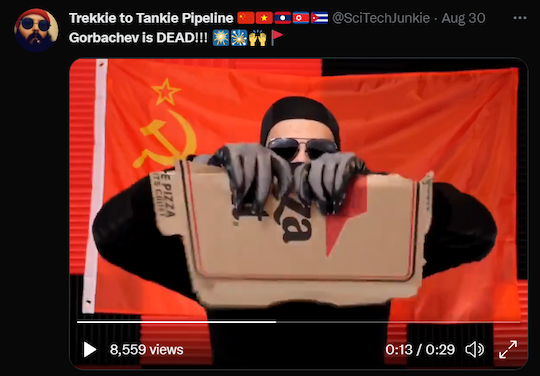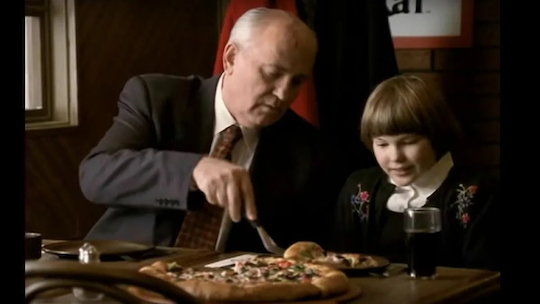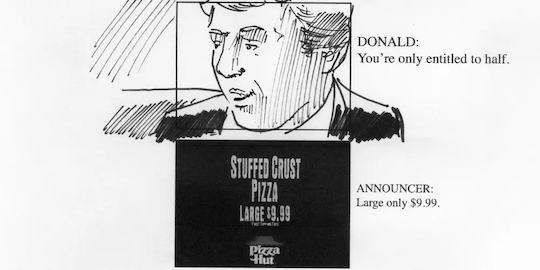Pizza Hut Left Russia, Gorbachev Died
Posted September 02, 2022
Chris Campbell
“Pizza Hut left Russia and now Gorbachev is dead,” reads the first Tweet that popped up on my feed this morning.
“It sucks,” another post said in response, “knowing he saw his life’s work taken from him. I hope he got one more slice before passing.”
Someone else uploaded a video of himself ripping up a Pizza Hut box in front of a Soviet flag.
The end of the video said “Enjoy your slice in hell Gorbachev.”

For those who are as confused as I was five minutes ago…
Gorbachev starred in the weirdest Pizza Hut commercial I’ve ever seen.
It was filmed in November 1997 on Red Square and in a Pizza Hut restaurant elsewhere in Moscow. (It only aired in the USA, not in Russia. In fact, for obvious reasons, he was widely criticized in his home country.)

The runner-up was Donald Trump’s Pizza Hut appearance with his soon-to-be ex-wife, Ivana. It ended with Trump saying, “You’re only entitled to half,” alluding to their ongoing divorce at the time, which was public knowledge.
(Ivana hated it, Trump loved it.)

If… in a strange and perhaps a little bit disturbing way…
Watching those old commercials makes you even a little bit nostalgic -- longing for seemingly simpler times -- then you’re not alone.
Below, our colleague Jeffrey Tucker explains this weird phenomenon. (And reveals why it’s not as strange as you think!)
Before we go there, however, a quick question…
Were you able to join Jim Rickards and his colleagues in yesterday’s urgent live ZOOM call?
Things are happening so fast, Jim felt compelled to host this event without much warning.
The discussion was packed with analysis you’re not hearing from the mainstream press… All about the biggest risks to your portfolio they’re not even AWARE of.
With help from Jim’s fellow experts, as well as great audience questions, the call was a huge success.
If you couldn’t make it, don’t worry. We recorded the entire thing for you so you can watch it for a limited time...
Click here to watch the exclusive replay.
And read on.
The Good Old Days of the Cold War
By Jeffrey Tucker
The death of Mikhail Gorbachev unleashed a wave of nostalgia for simpler and better times. That’s odd, isn’t it?
Not so much. The freedom revolution did not turn out as planned. The world never became normal and peaceful as promised. And today, we can only look back on the 1980s with affection for better times.
Back in the day, in the midst of the Cold War, we had an overwhelming sense of the world being held hostage and on the verge of a global nuclear war that could wipe out humanity as we knew it. One wrong move, one bad piece of intelligence, and boom the world would go up in fire and smoke.
The stakes were so high! It was not just about stopping the end of life on the planet. It was about an epic struggle between freedom (the U.S.) and tyrannical communism (the Soviet Union).
In our political landscape, much of American politics turned on whether it was wise to risk peace alongside a Soviet victory or go for a full vanquishing of evil from the planet.
The battle over communism defined the lives of many generations. Everything seemed so clear in those days. We were the good guys and they were the bad guys. We had to spy, fight, build up the military, fund the freedom fighters and generally be strong in the face of godless evil.
Ronald Reagan was just the champion that freedom needed in those days. He called the Soviet Union an “evil empire.” It drove the left nuts and cheered the base.
Then one odd day in 1987, he and Gorbachev met and decided that they would together rid the world of nuclear weapons. They were giddy about the idea and the whole world went into shock and amazement.
Gorbachev gained a victory at home – he ruled a poor and restless population sick of the nonsense – that encouraged him to seek more reforms, which only fed the appetite for more reform.
Reagan served two terms and left office. Then dramatic change hit the world from 1989–90. The Soviet Empire fell apart, gradually at first and then all at once. Gorbachev became the country’s last leader as Soviet communism became plain-old Russian autocracy over time. The world could now be free!
During this period I met Israeli historian Martin van Creveld. He was a scholar on war and terrorism. He held a usual view. He believed that the end of the Cold War was a disaster. He said the world would never be as peaceful as it was when two superpowers faced off with nuclear arsenals.
He described it as the perfect game for peace and prosperity. Neither would ever risk using the weapons but the prospect alone made states more cautious than they otherwise would be.
In fact, in his view, this nuclear standoff made the world as good as it could be given the circumstances. He dreaded what might happen once one of the two powers disappeared.
I simply could not accept that position. That’s because I bought all the propaganda that this was really about a victory for peace and freedom. With the Soviet Union gone, the U.S. could now safely return to its natural and constitutional status as a peaceful commercial republic, friendship with all and entangling alliances with none.
I was all in on the idea that we had finally reached the end of history: We would have freedom and democracy forever now that we knew that those systems were the best systems.
In those days, many on the left and right in American politics were screaming for normalcy. But there was a huge problem. The U.S. had built up a massive intelligence/military/industrial machinery that had no intention of just closing up shop. It needed a new rationale. It needed a new enemy. It needed some new scary thing.
If the U.S. could not find an enemy, it needed to make one.
China in those days wasn’t quite right for enemization, so the U.S. looked to old allies that could be betrayed and demonized. George H.W. Bush decided that Manuel Noriega was a bad money launderer and drug dealer and had to go. The U.S. military made it happen.
Good show! What else? In the Middle East, Iraq was becoming annoying. So George H.W. Bush seized on a border dispute between Iraq and Kuwait, portraying the tiny country as a victim of the big oppressor next door. He would have to intervene militarily.
Now, to be sure, this was not about the U.S. going on some wild new imperial crusade. No no. It was really about punishing aggression just this one time so that the entire world would learn forevermore never to disturb borders again.
It was a brief war for peace. It was two weeks to flatten the curve… wait, wrong war. It was two weeks to make the world safe for democracy.
Thus began what became a 25-year occupation. Just two days ago, the palace in Baghdad was ransacked yet again. This once civilized country that attracted the best and brightest students from the whole region is in utter shambles. This is what the U.S. did.
And that was just the start. The U.S., incredibly, replicated Soviet-style occupation in Afghanistan and ended up staying even longer. This was following the 9/11 attacks carried out as a retaliation against U.S. actions in Iraq and the disputed borders of Israel. The Department of Homeland Security came into being and Americans lost vast freedoms.
As for NATO itself, it never went away following the end of the Cold War but rather became another tool of provocation that the U.S. could use to poke its enemies. It was too much for Russia, which decided to settle scores in Ukraine, thus provoking U.S. and European sanctions that are driving the price of energy up for everyone but Russia.
The U.S. victory in the Cold War was massively and tragically misspent. Instead of doing a victory lap for freedom and constitutional government — that’s what we believe was the whole damn point — the U.S. went on a global crusade. Whole peoples suffered but we hardly felt it at all here at home. Life was good. The carnage abroad was all abstract.
With lockdowns and the current political and economic chaos, the global empire has come home to oppress us all in the most personal possible way. We now read tales of life in the Soviet Union and we recognize it all too well. We read 1984 by George Orwell and recognize it in our own experience.
Ah for the days of a smiling Reagan and Gorby! Together they decided to end the hell of the Cold War. We had no idea just how good we had it.
